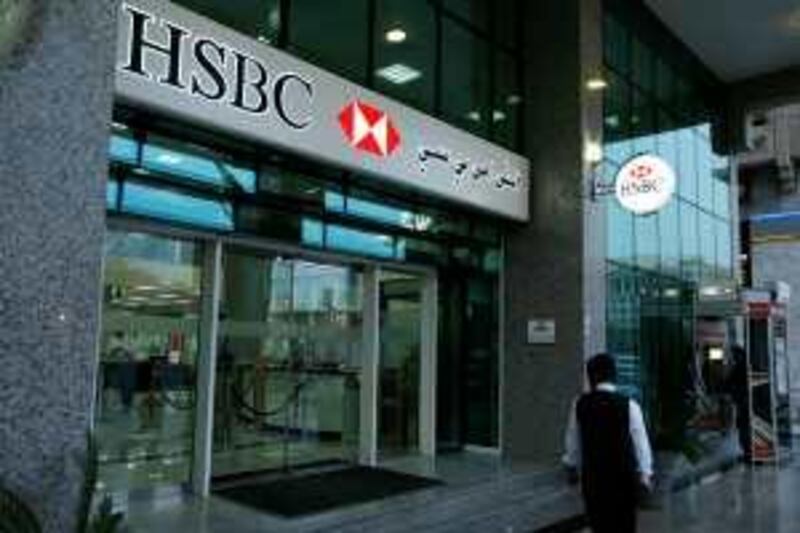Interbank borrowing rates fell by almost 20 per cent in the third quarter, but home loan companies are holding back from passing the full benefits on to customers. The Emirates interbank offered rate (Eibor), which banks use to lend to each other, fell to 1.98 per cent yesterday from 2.05 per cent a day earlier. The latest drop was recorded on the day the Central Bank introduced a new mechanism to set the interbank borrowing rate as it tries to bring Eibor more in line with prevailing market conditions.
Despite the sharp decline in borrowing costs over the past three months, consumers have yet to feel the benefits in the form of proportionately cheaper loans and mortgages. HSBC Middle East, one of the largest home lenders that reviewed its mortgage rates yesterday, said it cut its rate on mortgages involving 75 per cent financing on a property from 7.46 per cent to 6.98 per cent. That equates to less than half the corresponding fall in Eibor over the quarter.
"The spread at the time of signing the contract remains the same with the Eibor changes quarterly, so if the Eibor is going down, the customer's end rate will be on a decline," said Venkatesh Srikantan, the regional head of Assets and Liabilities at HSBC. Standard Chartered, another foreign lender heavily involved in home financing, has kept its base mortgage rate unchanged. Yesterday's fall to 1.98 per cent in the three-month Eibor compares with the peak rate of 4.8 per cent in November last year.
Analysts say a lower benchmark Eibor rate could help stabilise the interbank lending market, but may be of little immediate benefit to consumers because banks are unlikely to offer cheaper lending options while liquidity remains under pressure and they struggle under the burden of mounting bad loans. Mortgage lending is seen as being particularly high-risk after property prices in Dubai fell as much 50 per cent from their peak last year, leaving many investors with no equity.
"Lower Eibor will probably have little benefit for people who already hold mortgage contracts," said Raj Madha, a banking analyst at EFG-Hermes in Dubai. "People seeking new mortgages will certainly have no benefit from it," he said. Philippe Dauba-Pantanacce, a senior economist at Standard Chartered in Dubai, said the transmission mechanisms between Eibor and bank lending rates in normal market conditions should be smooth, but following the dislocation of global credit markets a significant rise in risk aversion had led banks to reassess those risks.
"The recent decline of Eibor does not reflect the true condition of the bank's liquidity levels. In fact, on average the UAE banks' loan-to-deposit ratio is still very high, above 100 per cent, and has actually even risen in the past months." The introduction of the new interbank borrowing mechanism could help the mortgage market become more transparent, according to Mr Madha. "Some mortgage holders may now find that they have been overcharged by the banks in the past. They may see some relief but it will all depend on the nature of their contract and how much the bank is willing to pass on the benefit," he said.
The availability of affordable home loans is seen as vital for a recovery in the residential property market. In the UAE, mortgages are usually offered on variable interest rates, where banks earn a certain percentage over Eibor. During the third quarter, HSBC was charging 5 percentage points over the July 1 three-month Eibor rate of 2.456 per cent for loans on 75 per cent or less of the property value.
Standard Chartered offers mortgages of between 6.5 per cent and 7 per cent while the local lender Abu Dhabi Commercial Bank (ADCB) offers mortgages as high as 4.75 per cent over its own base rate of 5 percentage points, pushing the total interest rate to 9.75 per cent a year, according to data available on the bank's website. A home finance executive at Standard Chartered in Dubai said its mortgage lending rate was unchanged.
"We calculate our rates based on our own base rate and are not much affected by the movement in Eibor," he said. The cost of mortgages in the UAE is much higher than in many other international markets. Regulators elsewhere have introduced stimulus measures to encourage consumer spending by cutting the cost of lending. Average 15-year mortgage rates in the US have dipped to 4.54 per cent, Freddie Mac, the Federal Home Loan Mortgage Corporation, said last month. Mortgage costs have tumbled even further in the UK, where HSBC is offering its lowest ever rate of 1.99 per cent.
skhan@thenational.ae






